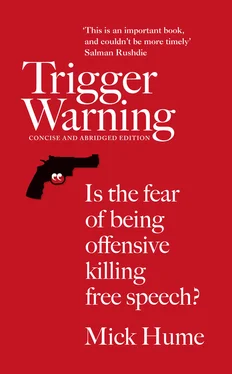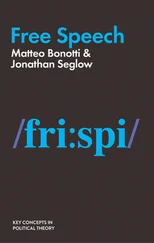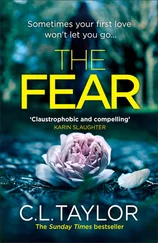The world has been turned upside down so that those who think of themselves as liberal- or even radical-minded are in the forefront of the attack on free speech in colleges. In the name of making universities ‘safe spaces’, student activists have demanded bans on ‘offensive’ speakers and comedians, books and videos, statues and sombreros. ‘Safe Space’ policies sound like unopposable mom-and-apple-pie policies. Who wants to make anywhere an ‘unsafe space’? The question is, however: safe from what? These policies go far beyond threats of violence or intimidation, to cover any opinion or language that some students may not like.
Apparently students must now ‘feel comfortable’ at all times. But if that was really all young people wanted, they surely could have stayed at home, tucked up safe and warm with their mums and dads. Restricting college life to students’ pre-set, safe comfort zone risks closing the door on the new – and worse, closing young minds.
Those supposed liberals attempting to ban views they find offensive might do well to recognise the historical company they are keeping. Two hundred years ago, fellows and students at Oxford University also took direct action to No Platform offensive opinions. They burned a pamphlet that, says one account, had caused ‘maximum offence’, while the university authorities expelled the author from Oxford. He was the nineteen-year-old Percy Bysshe Shelley, and the Romantic poet’s ‘little tract’ that caused such lofty outrage in 1811 was called The Necessity of Atheism . It would surely be better for today’s protesting students to try to follow in the footsteps of the taboo-busting Shelley rather than the Oxford conservatives and censors who banished the offensive student and his opinions from university life.
Entertainment might once have been considered a world where people could crack jokes or sing songs that were outside the rules of ‘respectable’ society and everyday life. No longer. The new free speech wars are being waged in some unlikely places, such as British football and the comedy scene on both sides of the Atlantic.
The campaign to rid football of offensive, improper and abusive language marks an extraordinary turnaround. Football was long ungoverned by the etiquette of everyday life, accepted as the home ground of what Sigmund Freud called ‘the id’, the more emotional, irrational side of the human psyche, where it was accepted that people could let rip and take a break from the rules of polite society.
By contrast the campaign to sanitise football has now reached the point where fans can be afforded even less free speech than they would be elsewhere in life. The Scottish government’s Offensive Behaviour at Football and Threatening Communications (Scotland) Act has created an extraordinary situation where a Rangers fans has been jailed for four months for the crime of singing an offensive song in a Glasgow street.
Comedy too has come under the watchful eye of the you-can’t-say-that culture. Good jokes are often in bad taste, mocking the respectable rules and morals of society, pushing at the limits of what passes for taste and decency in any era. There have long been attempts to control what is deemed ‘acceptable’ humour and to censor what is not.
However, as with other issues in the Anglo-American free-speech wars, the terrain has shifted. Once the complaints were about blasphemous and indecent comedy. Now the protests are more often against comedians accused of breaking the new taboos – racism, sexism, homophobia, transphobia, Islamophobia, anti-Semitism and the other usual suspects.
Comedy is a messy business, and people can laugh at the most outrageous things. The wish to dictate not just what jokes a comedian should tell, but also what we should laugh at, is the clearest conceivable attempt at thought control. What could be more intrusive than trying to police something as reflexive as a snort of laughter? The trends towards more conformist comedy put at risk one of the most important forms of release we have left in a dour world. This is no laughing matter. If comedians are not allowed to upset and offend, what chance have the rest of us got?
One other phenomenon which captures the mind-narrowing trends of our times is the onward march of the Trigger Warning, from which this book takes its title.
A Trigger Warning is an advisory label stuck at the front of a book, article, film or whatever to warn students that this work involves words or images that may traumatise them in some way. They have spread from US colleges across the Atlantic and the internet. Defenders of Trigger Warnings will argue that they amount to little more than a few words to help preserve the vulnerable from harm. But the truth is that those few words speak volumes about the parlous state of freedom.
Trigger Warnings were initially conceived as an online therapeutic tool to help victims in discussion forums for sufferers from Post-Traumatic Stress Disorder (PTSD). If somebody posted about a particularly violent or distressing experience, others could be forewarned that reading such a post might ‘trigger’ a traumatic memory and reaction in them.
Even conceived in these narrow terms, experts tell us, the concept of Trigger Warnings appears unconvincing. Extend the Trigger Warnings away from PTSD sufferers to books read by university students or films watched online, however, and the whole thing becomes a dangerous nonsense. Post-Traumatic Stress Disorder was developed as a category to describe the psychological effects suffered by those exposed to the horrors of war, violence or other extreme experiences. What has that to do with students or others being made to feel uncomfortable by some ‘naughty’ references in literature?
But while the causes might be slight, the consequences could be more serious in terms of the future of free speech and open discussion. Once the notion of trauma is reduced to ‘feeling uncomfortable’, the sky is surely the limit for Trigger Warnings. Today we are advised that students should be allowed to opt out of some classes and warned about reading classics from The Great Gatsby to Ovid’s Metamorphoses . Tomorrow the demand might be to stop teaching such ‘triggering’ texts altogether – and that list could stretch from Shakespeare to Game of Thrones , with much in between. As wags have observed, why not put TWs on Trigger Warnings, to warn that they are about to mention sex or violence?
Trigger Warnings are a model of how all the talk about harm and vulnerability and comfort can become a coded way of undermining both sides of free expression – the freedom to speak or write what you like, and the equally important freedom to read or listen and judge for yourself. That should be the most serious warning of all to anybody who feels ‘uncomfortable’ at the undermining of freedom of speech.
In response to all this we need to take an uncompromising stand for unfettered free speech with no buts, bans, prison sentences or guns to the head. That must mean defending it as an indivisible liberty, for all or none at all. Free speech is always primarily about defending what a US Supreme Court justice once described as ‘freedom for the thought that we hate’.
Those who campaign on free-speech issues often see them as rights to be defended for high-minded dissidents in faraway places. The notion of demanding free speech closer to home for, say, tabloid hacks, vulgar internet ‘trolls’ or uncouth sports fans would horrify many a British civil liberties lobbyist (emphasis on ‘civil’, as in well-mannered, rather than liberties, as in free-for-all).
Yet there are important reasons in principle and practice why we need to defend free speech for all. A universal liberty cannot be divided. Once we allow free speech to be questioned for some then what should be right instead becomes a privilege, to be doled out from above like charity to those deemed deserving. And when it comes to ‘selective’ censorship, one thing always leads to another.
Читать дальше












